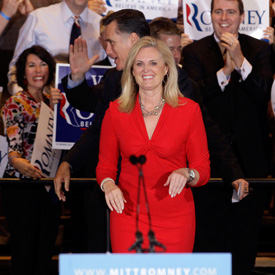Is He up to the General Election Two-step?
No doubt about it, earlier this week the U.S. election battlefield shifted in a major way. No more carpet-bombing of Mitt Romney ads attacking Rick Santorum and no more rants from Santorum warning that Romney will turn into a carbon copy of President Obama.

Ann Romney joins her husband Mitt in trying to win over women voters to the Republican side. Photo: AP
We are not in Kansas anymore, or any other of the primary states for that matter, and Romney must now shift most of his attention to the coming general election campaign against the president while at the same time shoring up a somewhat shaky conservative Republican Party base.
Romney and his wife Ann plunged into this big-time this week with a focus on luring back some women voters who, according to the polls, are finding his campaign wanting.
The latest skirmish also featured a back and forth between Ann Romney and Democratic strategist Hillary Rosen as they argued over the role of modern women both at home and in the workplace. Eventually many Democrats, including the president and First Lady, weighed in in defense of Ann Romney in an attempt to defuse an issue that was beginning to hurt the Democrats.
Expect this kind of skirmishing to continue right up to the election in November. Obama and the Democrats will try to maximize what is a pretty wide gender gap at the moment while Republicans will do all they can to narrow that gap and win back some of those moderate women voters who were put off by the Republican primaries and all the talk of birth control and abortion.

Getting more women on board is crucial to Mitt Romney's presidential chances. Photo: AP
The gender gap breakdown is important in presidential politics. When it’s big and women heavily favor Democrats, like when Bill Clinton ran in 1992 and Barack Obama four years ago, it’s usually a recipe for a Democratic victory. But if the gap is narrow and is combined with a huge Republican advantage among men, then the White House usually goes Republican.
Campaigning for the November presidential election is already looking pretty divisive on a number of fronts. In addition to the gender gap, there is the issue of rich versus poor, which the president and Democrats in Congress seem eager to push. The Republicans will continue to push concerns about the debt, high taxes and the size of government. They’ll also try to stay away from debating whether tax cuts for the wealthy are a good idea if they benefit Wall Street moguls who had a role in the financial meltdown.
Add to that immigration, where Hispanic voters are a very important piece of the puzzle, and health care, where the Supreme Court will render a judgment soon on the president’s health care law, and you have a whole bushel of issues that are divisive and polarizing and that will color the election landscape between now and November.

Polls show the president has an edge among women voters, but will it last? Photo: AP
But Romney will have to keep looking over his right shoulder now and then as well. Some of the conservative evangelical leaders have been quoted as saying they will probably get in line behind him for the election, but that there will be a noticeable lack of enthusiasm for him personally as the Republican candidate. That enthusiasm, they say, will have to come from a united belief in the importance of preventing President Obama from winning a second term in office.
I do think a lot of that enthusiasm will come together eventually, with support not only from social conservatives but also from Tea Party activists who realize they will have only chance, November 6th, to prevent the president from holding forth in Washington for another four years.
Still, Romney’s less than inspiring performance among conservative activists in the primaries and caucuses could come back to haunt him if he is unable to rally those groups between now and November.
Afghanistan as U.S. Election Issue
The recent polls on domestic backing for the war in Afghanistan are grim and signal a new low in support. The latest Washington Post-ABC News survey found 66 percent of those asked do not believe the war in Afghanistan has been worth fighting, a record high. Thirty percent continue to believe the war is worth the effort.
It will be interesting to see how this plays out for both the president’s re-election campaign and his Republican challenger, Mitt Romney. The president has a timetable for the withdrawal of U.S. troops by 2014, but recent incidents in Afghanistan seem to have soured the American public on the conflict even more, and voters might be eager to see that timetable sped up if the violence continues, especially when it targets U.S. troops.

U.S. troops in Afghanistan could be a campaign issue. Photo: AP
Mitt Romney has talked a lot about Afghanistan during the Republican primaries, insisting the U.S. must stay the course to defeat the Taliban on the battlefield. He also promises that he will listen to commanders on the ground as to when the right time comes to pull out U.S. forces.
The latest Post-ABC poll also found that for the first time a majority of Republicans now believe the war in Afghanistan has not been worth it. We’ll have to see how much Romney talks up the war during the general election campaign or whether he relegates it even further into the background as he focuses on the economy, jobs and repealing the president’s health care law, known as “Obama-care.”
The polls show there is little doubt that Americans are suffering from war fatigue from the twin conflicts in Iraq and Afghanistan and that most people believe it is time to come home and focus on domestic issues, especially the economy.
Another question is how will the public’s fatigue with Afghanistan plays into an election year debate over what to do about Iran’s nuclear ambitions?
Romney and many of the other Republican contenders talked tough about Iran throughout the primaries, and tried to use that as an example of where they believe the president was “soft” in foreign policy. There is little doubt many Americans are concerned about the prospect of an Iran with nuclear weapons, but in a country suffering from war fatigue, just how far can Romney push the idea of an aggressive U.S. stance against Iran when his audience is no longer just conservatives, but moderate swing voters as well?

